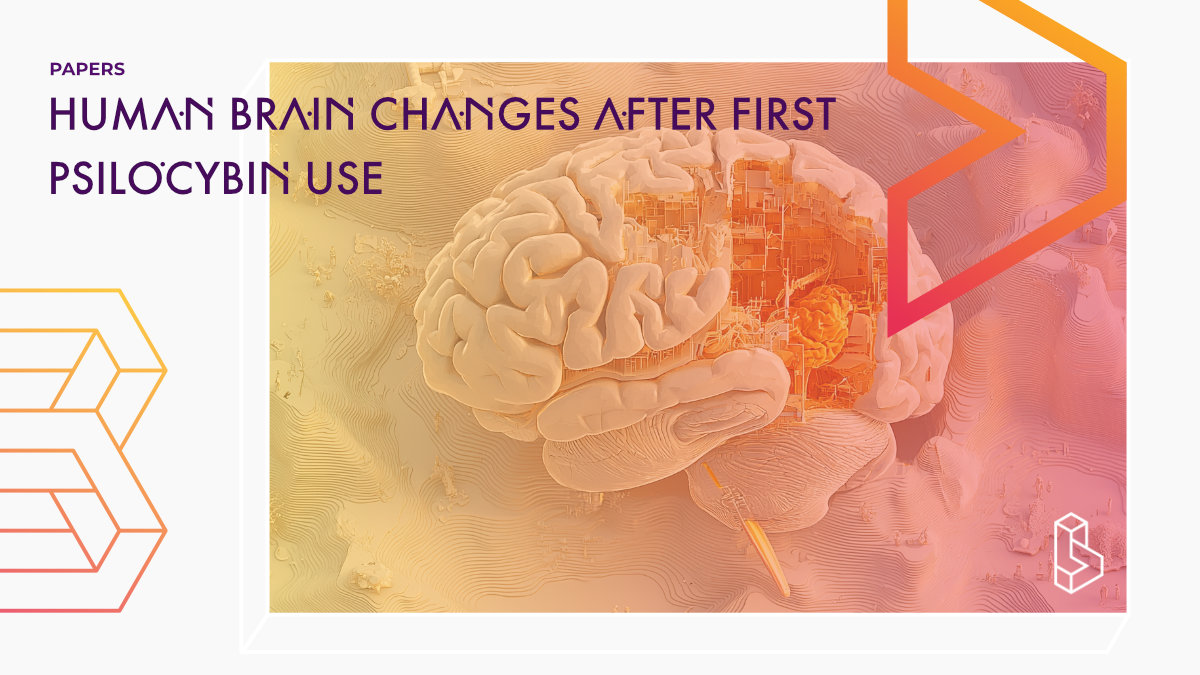This pre-print, placebo-controlled, within-subjects neuroimaging study (n=28) of psychedelic-naive participants finds that a single high dose of psilocybin (25mg) produces anatomical and functional brain changes from one hour to one month post-dosing. These include decreased axial diffusivity in prefrontal-subcortical tracts, reduced brain network modularity (linked to improved well-being), and increased cortical signal entropy that predicts long-term psychological benefits. These effects were not observed with a 1 mg placebo dose.
Abstract of Human brain changes after first psilocybin use
“Psychedelics have robust effects on acute brain function and long-term behavior but whether they also cause enduring functional and anatomical brain changes is unknown. In a placebo-controlled, within-subjects, electroencephalography, and magnetic resonance imaging study in 28 healthy, entirely psychedelic-naive participants, anatomical and functional brain changes were detected from one-hour to one-month after a single high-dose (25 mg) of psilocybin. Increases in cognitive flexibility, psychological insight, and well-being were seen at one-month. Diffusion imaging done before and one-month after 25mg psilocybin revealed decreased axial diffusivity bilaterally in prefrontal-subcortical tracts that correlated with decreased brain network modularity over the same time period. Decreased modularity also correlated with improved well-being. Increased cortical signal entropy at 1– and 2-hours post-dosing predicted improved psychological well-being at one-month. Next-day psychological insight mediated the entropy to well-being relationship. All effects were exclusive to 25mg psilocybin; no effects occurred with a 1mg psilocybin ‘placebo’ dose.“
Authors: Taylor Lyons, Megg Spriggs, L. Kerkelä, F. E. Rosas, Leor Roseman, P.A.M. Mediano, Chris Timmermann, L. Oestreich, B.A. Pagni, R. J. Zeifman, A. Hampshire, W. Trender, H. M. Douglass, M. Girn, K. Godfrey, H. Kettner, F. Sharif, L. Espasiano, A. Gazzaley, M. B. Wall, David Erritzoe, David J. Nutt & Robin L. Carhart-Harris
Summary of Human brain changes after first psilocybin use
Psilocybin, the active compound found in psychedelic mushrooms, is a prodrug of psilocin—a substance that acts primarily through the serotonin 2A receptor (5-HT2AR). Activation of this receptor is widely believed to underlie the characteristic mental and neurological effects of psychedelics. Previous animal studies have linked 5-HT2AR activity to neuroplasticity—the brain’s ability to change and reorganise itself structurally and functionally. In human studies, high doses of psilocybin have been associated with lasting improvements in psychological well-being and cognitive flexibility, particularly in individuals with depression. However, whether a single dose of psilocybin can result in measurable long-term structural and functional changes in the human brain remains unclear.
To explore this question, Lyons and colleagues conducted a placebo-controlled, within-subject study in healthy adults who had never previously used psychedelics. Participants received both a low-dose (1 mg) and a high-dose (25 mg) of psilocybin in separate sessions spaced one month apart. The research team utilised electroencephalography (EEG), magnetic resonance imaging (MRI), and behavioural assessments to measure changes over time. This design allowed the authors to compare acute (1–4.5 hours post-dose) and long-term (one month later) effects of psilocybin within the same individuals.
Results
Demographics
The study included 28 healthy volunteers with an average age of 41 years. About 43% of the participants were female. All were naïve to psychedelic substances prior to the study.
Neuroimaging Outcomes
Acute Brain Effects
Find this paper
Human brain changes after first psilocybin use
https://doi.org/10.1101/2024.10.11.617955
Open Access | Google Scholar | Backup | 🕊
Cite this paper (APA)
Lyons, T., Spriggs, M., Kerkelä, L., Rosas, F. E., Roseman, L., Mediano, P. A. M., ... & Carhart-Harris, R. L. (2024). Human brain changes after first psilocybin use. BiorXiv, 2024-10.
Study details
Compounds studied
Psilocybin
Placebo
Topics studied
Neuroscience
Healthy Subjects
Study characteristics
Original
Placebo-Controlled
Single-Blind
Within-Subject
Bio/Neuro
Participants
28
Humans
Compound Details
The psychedelics given at which dose and how many times
Psilocybin 25 mg | 1x
